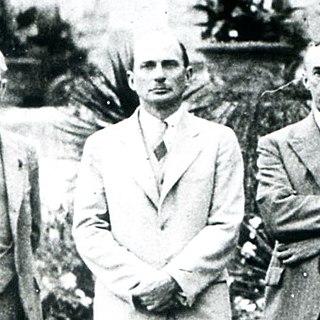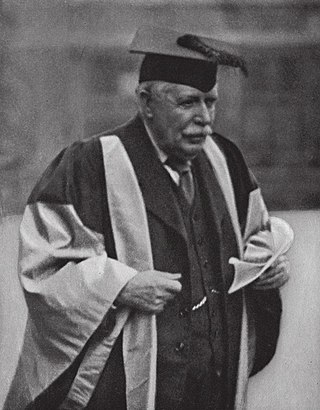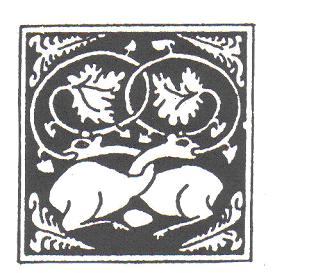Philology is the study of language in oral and written historical sources; it is the intersection of textual criticism, literary criticism, history, and linguistics with strong ties to etymology. Philology is also defined as the study of literary texts as well as oral and written records, the establishment of their authenticity and their original form, and the determination of their meaning. A person who pursues this kind of study is known as a philologist. In older usage, especially British, philology is more general, covering comparative and historical linguistics.
René Wellek was a Czech-American comparative literary critic. Like Erich Auerbach, Wellek was an eminent product of the Central European philological tradition and was known as a vastly erudite and "fair-minded critic of critics."
The Modern Humanities Research Association (MHRA) is a United Kingdom–based international organisation that aims to encourage and promote advanced study and research of humanities. It is most notable for producing the MHRA Style Guide.

Medieval Latin was the form of Literary Latin used in Roman Catholic Western Europe during the Middle Ages. In this region it served as the primary written language, though local languages were also written to varying degrees. Latin functioned as the main medium of scholarly exchange, as the liturgical language of the Church, and as the working language of science, literature, law, and administration.

Winfred Philip Lehmann was an American linguist who specialized in historical, Germanic, and Indo-European linguistics. He was for many years a professor and head of departments for linguistics at the University of Texas at Austin, and served as president of both the Linguistic Society of America and the Modern Language Association. Lehmann was also a pioneer in machine translation. He lectured a large number of future scholars at Austin, and was the author of several influential works on linguistics.

Roger Sherman Loomis (1887–1966) was an American scholar and one of the foremost authorities on medieval and Arthurian literature. Loomis is perhaps best known for showing the roots of Arthurian legend, in particular the Holy Grail, in native Celtic mythology.

Hector Munro Chadwick was an English philologist. Chadwick was the Elrington and Bosworth Professor of Anglo-Saxon and the founder and head of the Department for Anglo-Saxon and Kindred Studies at the University of Cambridge. Chadwick was well known for his encouragement of interdisciplinary research on Celts and Germanic peoples, and for his theories on the Heroic Age in the history of human societies. Chadwick was a tutor of many notable students and the author of numerous influential works in his fields of study. Much of his research and teaching was conducted in cooperation with his wife, former student and fellow Cambridge scholar Nora Kershaw.
Frederick (Noel) Wilse Bateson was an English literary scholar and critic.

Modern Language Review is the journal of the Modern Humanities Research Association (MHRA). It is one of the oldest journals in the field of modern languages. Founded in 1905, it has published more than 3,000 articles and 20,000 book reviews.

The Medieval Chronicle Society is an international and interdisciplinary organization founded to facilitate the work of scholars interested in medieval annals and chronicles, or more generally medieval historiography. It was founded in 1999 and in February 2011 had 380 members.
Supplementum Epigraphicum Graecum (SEG) is an annual survey collecting the content of and studies on Greek inscriptions published in a single year. New inscriptions have full Greek text and critical apparatus, and studies of older inscriptions have brief summaries. The survey covers publications of inscriptions from the entire Greek world, although material later than the 8th-century A.D. is not included. Each issue contains the academic yield of a single year, delayed for a few years
Michael D. C. Drout is an American Professor of English and Director of the Center for the Study of the Medieval at Wheaton College. He is an author and editor specializing in Anglo-Saxon and medieval literature, science fiction and fantasy, especially the works of J. R. R. Tolkien and Ursula K. Le Guin.
Brian Oliver Murdoch is a British philologist who is Emeritus Professor of German at the University of Stirling. He specializes in the study of early Germanic and Celtic literature, on which he has authored and edited several influential works.

Edgar Ghislain Charles Polomé was a Belgian-American philologist and religious studies scholar. He specialized in Germanic and Indo-European studies and was active at the University of Texas at Austin for much of his career.

Leeds Studies in English was an annual academic journal dedicated to the study of medieval English, Old Norse-Icelandic, and Anglo-Norman language and literature. It was published by the School of English at the University of Leeds. In 2020, it was announced that Leeds Studies in English would merge with the Bulletin of International Medieval Research to become Leeds Medieval Studies, based in the Leeds Institute for Medieval Studies.
Ursula Miriam Dronke was an English medievalist and former Vigfússon Reader in Old Norse at the University of Oxford and an Emeritus Fellow of Linacre College. She also taught at the University of Munich and in the Faculty of Modern and Medieval Languages at Cambridge University.
Jan Ziolkowski occupies the Arthur Kingsley Porter Professorship of Medieval Latin at Harvard University. From 2007 to 2020 he served as Director of the Dumbarton Oaks Research Library and Collection. His scholarship has focused on the literature, especially in Latin, of the Middle Ages.
Archer Taylor was one of America's "foremost specialists in American and European folklore", with a special interest in cultural history, literature, proverbs, riddles and bibliography.
Nicola Anne Lulham Bradbury is an English literary critic, lecturer, editor, and author, specializing in the 19th century novel.







